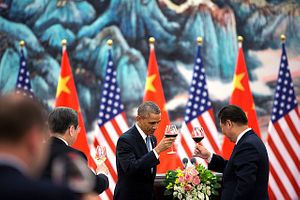In 1910, Englishman Norman Angell wrote the book The Great Illusion to address the myth that nations could economically benefit from war. At the time that Angell was writing, popular and elite opinion assumed that a nation’s political power determined its prosperity, and that countries with preponderate military strength would have the greatest advantage. Angell acknowledges that this belief had validity in the past, however by the 1900s a country’s wealth became dependent on credit and commercial contract provided by the international financial system. Because of the delicate working of this system, if country A invades country B, than the chaos caused by the invasion would damage A’s access to credit. Moreover, country A would be unable to confiscate country B’s wealth without damaging its own economic well-being, and would destroy country B’s citizen’s will to do the work that is responsible for wealth creation. Through this reasoning, Angell argues that conquest and military power have become economically futile.
Angell’s work can provide insight into the possibility of conflict between the United States and China. According to a 2011 RAND study, conflict between the United States and China would likely lead to a global contraction greater than the one that occurred in 2008. For the United States, the economic losses would likely be even higher given the interdependent nature of the U.S.-Chinese economies. In 2014, total U.S.-China trade was worth $592 billion, China was the United State’s second largest trading partner, third largest export market, biggest source of imports, and the largest foreign holder of American debt, with $1.24 trillion worth of U.S. Treasury bonds in December 2014.
According to Angell’s theory, if the United States cares about prosperity, it should avoid a war with China, from which it can only suffer economic losses. This potential for economic loss can act as a deterrent for both the United States and China, so the United States should not consider reducing economic dependence on China as a way to increase its own security, as some pundits have suggested. Beyond economic ties between the United States and China, the United States should encourage China’s further integration into the world economic system. The United States should not oppose Chinese efforts to join, or create, multilateral economic institutions, such as the new Chinese led Asia Infrastructure Investment Bank. In addition, the United States should not attempt to persuade allies from increasing economic ties with China, as it will reduce the chance of an ally dragging the United States into a war with China.
It would be hard to find anyone in either China or America who would argue that a conflict would increase prosperity. Both economies are too big to fail without having severe effects on the entire international economic system. Because of this, there exists a state of mutually assured economic destruction between the two countries. Despite this, as John Mearsheimer points out, states value security over economic prosperity, because without security they cannot ensure their survival. This is not to say that the United States should break its economic ties with China, or try to slow China’s economic growth. That would hurt the United States economically and would have little utility for increasing security. In addition, the more economically integrated China and the United States are, the higher the cost is for China to challenge the current system, reducing the chance of war. However, if China perceives that it can benefit from conflict with the United States, China’s action will be the same whether its perception is correct or not.
It is for this reason, then, that unless China and the United States both accept Angell’s ideas, economic interdependence with China will not guarantee security.
Leon Whyte is a second year master’s candidate at the Fletcher School of Law and Diplomacy at Tufts University as well as the Senior Editor for the Current Affairs section of the Fletcher Security Review. His research interests include transnational security and U.S. alliances in East Asia.

































